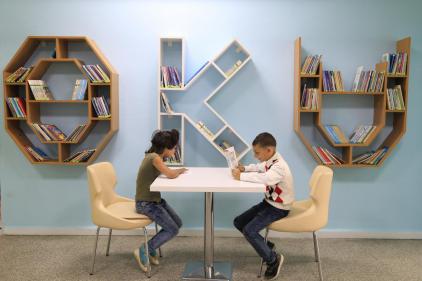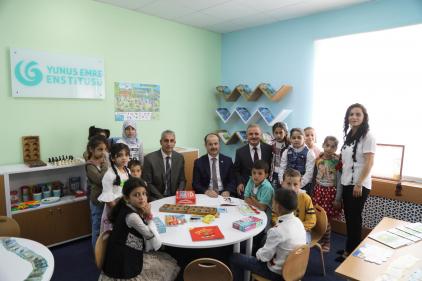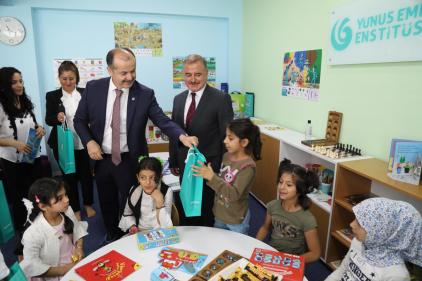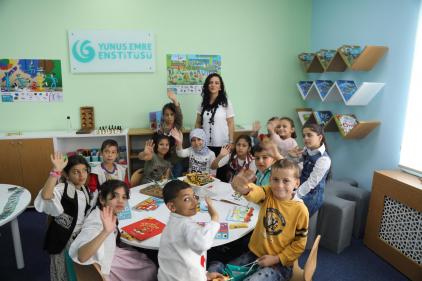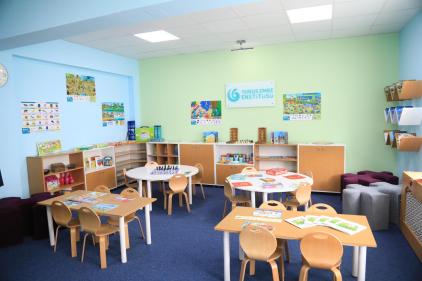Yunus Emre Institute opens Turkish classroom at Solfasol Primary School
Yunus Emre Institute President Prof. Dr. Şeref Ateş paid a second visit to Solfasol Primary School in Altındağ district of Ankara, where he attended the ceremony for opening of the Turkish classroom.
Previously, the book titled "Resimlerle Kelime Öğreniyorum" (Learning Vocabulary with Pictures) and auxiliary materials developed by the Institute for teaching Turkish as a foreign language had been distributed to students as giveaways as requested by the school which is attended primarily by Syrian children living in the district. This time, Yunus Emre Institute sponsored the opening of a classroom dedicated to the teaching of the Turkish language.
The president of the Institute, Ateş, addressed the students at the classroom, drawing attention to the importance of language in communication. "This world belongs to children. They have to learn the language in order to express their views and ideas. This classroom has been developed as a project piloted so that the children who were victims of war and are now our guests in Turkey can learn Turkish with fun, and we hope that it will set an example," he said, stressing his expectation that the classroom will be taken as a model by other projects for teaching the Turkish language through practical examples.
There has been increased interest in learning Turkish abroad, Prof. Dr. Ateş told Anadolu Agency. He indicated that 56 cultural centers, established by the Institute, as well as the Turkish language teaching courses, provided under the scope of the Turkology project in collaboration with universities, were seeing intense demand all around the globe.
Noting that they have developed the Distance Turkish Learning platform to meet this demand, Ateş said: "Currently, 120,000 people all over the world are learning Turkish free of charge on the Internet. This includes the Syrian people who live in Turkey as well. Given the fact that we make available the Turkish learning materials, developed by Yunus Emre Institute, in every part of the world, we cannot be deaf to the demands of immigrant children, especially those from Syria, who have sought refuge in our country for learning Turkish. Yunus Emre Institute has already been teaming up with national authorities in many countries, including Bosnia-Herzegovina, Georgia, and Poland, to make sure that children take Turkish language as an elective course in secondary schools. Along the same lines, we need to develop standards for teaching the Turkish language for the foreign children who have come to our country as victims or who are born in our country."
The president of the Institute, Ateş, explained that the Turkish classroom which was opened as a pilot project in Solfasol Primary School in this context sought to teach students the Turkish language in its natural setting. He pointed out that the children who were victimized by war should be able to make sense of the language spoken in Turkey in order to develop affinity with our country, adding that he hoped that the Turkish classroom would set a good example in this regard.
During the ceremony, National Education District Director Dr. Zülkarneyn Avcı underlined that the training materials developed by Yunus Emre Institute for teaching Turkish as a foreign language for immigrant children who sought refuge in Turkey due to the civil war in Syria serve to satisfy an important need.
Solfasol Primary School Principal Bahattin Çetinkaya voiced his satisfaction for the contribution the classroom would make to education in the school which was attended primarily by Syrian children.
Nearly all students at the kindergarten, 1st, 2nd, and 3rd grades are Syrian, and in the Turkish classroom, they can have access to the books titled "Türkçe Öğreniyorum" (I am Learning Turkish), "Çocuklar için Türkçe" (Turkish for Kids), and "Resimlerle Kelime Öğreniyorum," prepared by Yunus Emre Institute for learning Turkish as a second language through easy and fun activities, as well as language teaching placards, reading books by various publishers, illustrated dictionaries, word cards, coloring books, Karagöz and Hacivat sets, and brain teasers like mangala and chess.

